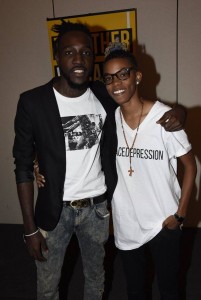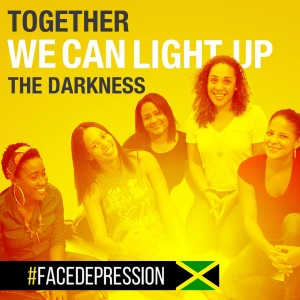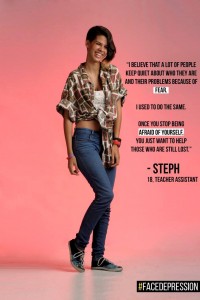
Lighting the Darkness Together: #FaceDepression
August 2nd, 2016
Smiling faces are pinned on the walls: brightly colored memes. The photographs are of mostly young people, and we may even recognize one or two. In the white room people stand and talk, sip cups of soup, pick up information leaflets and look at the artistic displays. A small tree stands decorated with headlines cut from the newspapers; one is of the recent suicide of a deejay named Delus.

Founder of #FaceDepression, Camille “Adaeze” Evelyn with singer Alex A-game Gallimore, who performed at the launch. He is still mourning his friend, musician Delus, who took his own life recently. (Photo: Lionel Rookwood)
We were gathered for the launch of #FaceDepression, a Caribbean social media campaign aimed not only at raising awareness on the disease – but also, and most importantly, “de-stigmatizing” it. The project is a partnership between the DaeDream Foundation in Barbados and Face Depression Jamaica. #FaceDepression was established in 2015 by Barbadian hip hop artist and activist Camille “Adaeze” Evelyn – a wryly humorous and endearing young woman wearing an over-sized T shirt, with a quirky topknot on her head. She said she hoped we understood her accent, and went on to tell about how her own depression progressed (she was diagnosed with bipolar disorder in 2013) to the point where she had to spend time in hospital. When she emerged, she felt she had to do something to reach out to those who are suffering (for the most part, silently), and established the DaeDream Foundation. #FaceDepression Jamaica is a young team, headed by Chalanie Stiebel.
The stigma exists in the Caribbean, there is no doubt; and as with stigma in other areas, it prevents those affected from seeking help; it is disempowering and it marginalizes you. You don’t want people to know, in case they think you are crazy. In fact, you may not even want to identify yourself as depressed. Yet, 80 per cent of depressed people do see significant improvements in their lives when they seek help. What they really need is acceptance, and support.
The major theme in the campaign is Together We Can Light Up the Darkness. It’s optimistic as well as youthful, and there are two key words in this phrase: “together” and “light.” The imagery of dark and light is one often used by people with depression. During bad periods, it is as if a shadow comes over you, and stays with you; or as if you are slipping into a black hole, or walking into a dark room, the door closing behind you.
So, we need always to reach for that healing light. Perhaps even literally, as Alexis Goffe observes on video. “Time in the sun was one of the major forces that got me out of depression,” he says. Research has actually shown that serotonin levels are higher on sunny days (serotonin is a brain neurotransmitter often linked to depression). Sunlight is also a source of Vitamin D, one of those hard-to-get vitamins that many of us are deficient in, and which may also have a connection with depression. So let’s do a little sunbathing, from time to time.
“Together” is an important word, too.The room was full, and there was a sense of warmth and empathy among those who attended. When there was a show of hands later, most of the audience indicated that they either suffered from depression, or knew someone who did. Almost every hand was raised. This simply demonstrated that Jamaicans with depression are truly not alone. In fact, one in four human beings around the world live with depression – an estimated 350 million, of all ages. The World Health Organization notes: “The burden of depression and other mental health conditions is on the rise globally” and fewer than half (much fewer, in some countries) get help.
Human rights advocate Susan Goffe said she was proud that her son Alexis was one of the voices of the campaign. She spoke of the importance of empathy, advocacy and sharing information.
#FaceDepression is looking for people to share their stories. You can read some of them on the website. Hearing someone’s personal story can really help you to work through your own concerns; and most importantly, there is the realization that someone else has traveled down that road on which you thought you were walking alone. In fact, that person may be walking alongside you. So, if you go to the campaign website (link below) you will find a contact page where you can indicate your interest in getting involved. You can also read several heartfelt stories that are already posted.
You can find the campaign at @FaceDepression on Twitter; on Facebook (Face Depression); and on their website (www.facedepressiontogether.com). There is also a hotline in Jamaica (8:00 a.m. to 4:00 p.m. on weekdays): (876) 930-1152.
Please do share this information with anyone you know who might be interested. You might even save a life.
Tags: #FaceDepression, advocacy, Alex A-game Gallimore, Alexis Goffe, Barbados, Camille Adaeze Evelyn, Caribbean, DaeDream Foundation, Delus, depression, Jamaica, mental health, social media, stigma, suicide, sunlight, Susan Goffe, Vitamin D, World Health Organization
The Gleaner reserves the right not to publish comments that may be deemed libelous, derogatory or indecent.
To respond to The Gleaner please use the feedback form.
- We Are the Zoomers
- Living Online with Humans and Birds: NAOC 2020
- Human Trafficking and the Problem of Public Education
- Down Memory Lane
- Are We Ready to Recover from COVID-19?
- Road Safety Matters: Is Your Vehicle Safe?
- Sexual Harassment, Me Too, and the Minister’s Disturbing Giggle
- The Vulnerable Senior Citizens, Private Care Homes and COVID-19
- A Muddle Over Masks
- Here is Something Life-Saving You Can Do: Give Blood!




